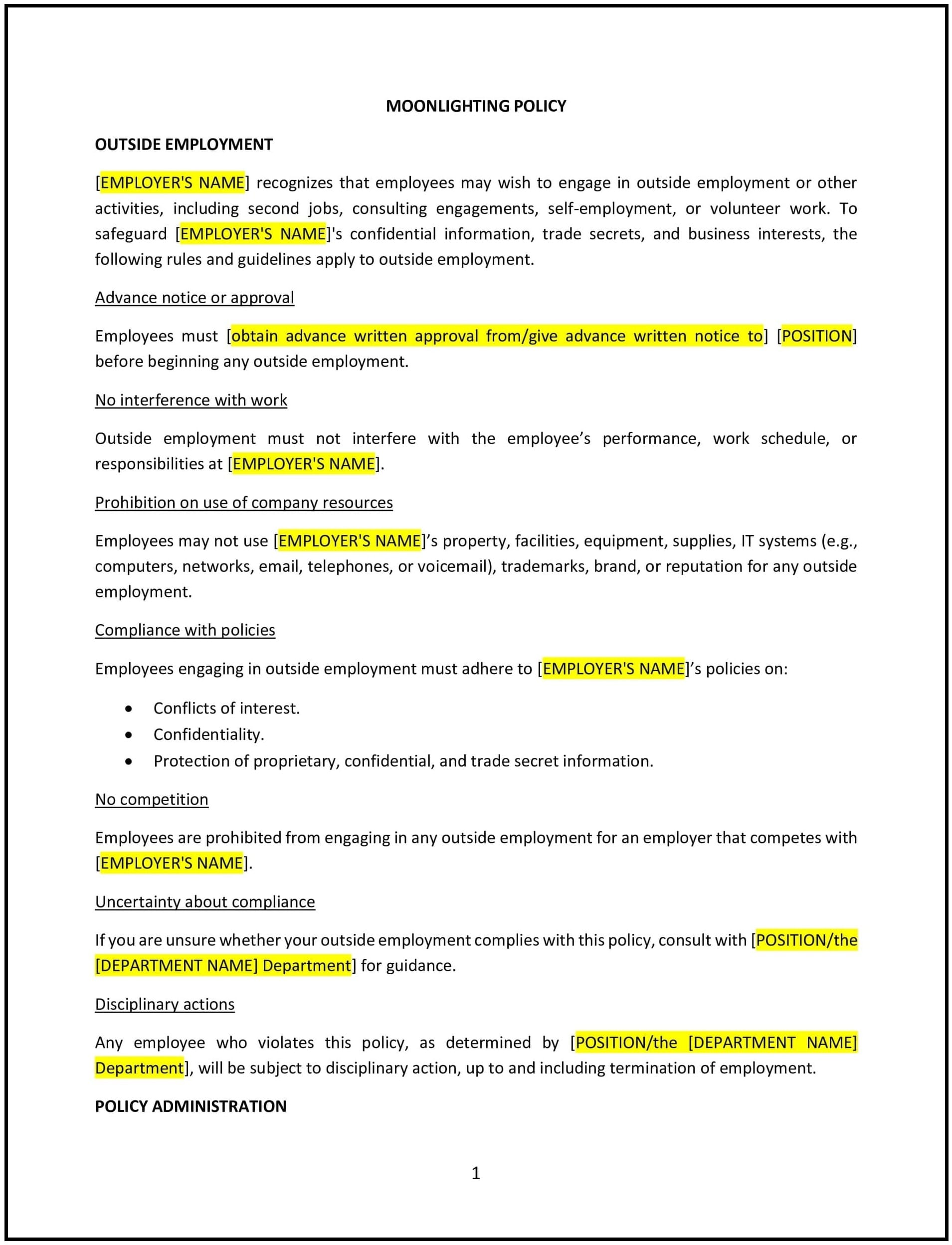Got contracts to review? While you're here for policies, let Cobrief make contract review effortless—start your free review now.

Customize this template for free
Moonlighting policy (Ohio)
A moonlighting policy provides Ohio businesses with guidelines regarding employees taking up additional employment or business activities outside of their primary role within the company. This policy outlines the expectations, limitations, and reporting requirements for employees who wish to engage in outside work. It ensures that any external employment does not conflict with the employee’s duties or the business's interests, protects the business from potential conflicts of interest, and helps maintain productivity and focus.
By implementing this policy, Ohio businesses can manage potential conflicts, maintain employee productivity, and ensure that outside employment does not interfere with business operations.
How to use this moonlighting policy (Ohio)
- Define outside employment expectations: The policy should specify the business’s stance on outside employment, including whether employees are allowed to take up additional jobs or start side businesses. It should clarify that outside work should not interfere with their responsibilities within the business.
- Set guidelines for disclosure: The policy should require employees to disclose any outside employment that may create a conflict of interest or affect their performance. Employees should inform their supervisor or HR before accepting additional work.
- Address potential conflicts of interest: The policy should outline what constitutes a conflict of interest, such as working for a direct competitor, engaging in activities that undermine the company’s goals, or using company resources for personal projects.
- Ensure confidentiality and non-compete agreements: The policy should emphasize that employees are expected to maintain the confidentiality of company information and not use proprietary knowledge in any outside employment. Employees should also be reminded of any non-compete or non-disclosure agreements they have signed.
- Set limits on working hours: The policy should specify any restrictions on the number of hours an employee can dedicate to outside work, ensuring that it does not interfere with their primary job responsibilities or affect their health and productivity.
- Encourage transparency: The policy should encourage open communication between employees and management, ensuring that employees feel comfortable disclosing outside employment while safeguarding the business’s interests.
- Define consequences for non-compliance: The policy should outline the consequences for employees who fail to comply with the moonlighting guidelines, which could include disciplinary action, reassignment, or termination depending on the severity of the violation.
- Review and update regularly: The policy should be reviewed periodically to ensure it remains in line with Ohio state laws, business needs, and any evolving industry standards.
Benefits of using this moonlighting policy (Ohio)
This policy provides several key benefits for Ohio businesses:
- Reduces conflicts of interest: By requiring employees to disclose outside employment, the policy helps prevent potential conflicts that could arise from competing interests or personal ventures that interfere with the business’s goals.
- Maintains productivity: The policy helps ensure that employees’ outside employment does not negatively impact their primary job performance, ensuring that they remain focused and productive at work.
- Protects business interests: The policy helps protect the business’s intellectual property, confidential information, and competitive edge by ensuring that employees do not use their role within the company to gain advantages in outside ventures.
- Fosters transparency and trust: Clear guidelines on outside employment encourage open communication between employees and managers, promoting a culture of transparency and trust.
- Enhances work-life balance: By setting limits on outside employment, the policy helps employees maintain a healthy work-life balance, reducing the risk of burnout and ensuring they can perform effectively in their primary role.
- Supports legal compliance: The policy helps businesses comply with relevant Ohio state laws and regulations regarding outside work and conflicts of interest, reducing the risk of legal disputes.
Tips for using this moonlighting policy (Ohio)
- Communicate the policy clearly: Ensure all employees are aware of the moonlighting policy by including it in the employee handbook, reviewing it during onboarding, and providing training on the importance of avoiding conflicts of interest.
- Monitor compliance: Establish a system for tracking employee disclosures of outside employment and ensuring that employees adhere to the policy. Managers should regularly check in with employees about any changes to their outside work activities.
- Encourage open dialogue: Foster an environment where employees feel comfortable discussing outside employment and any potential concerns with their supervisor or HR department.
- Enforce the policy consistently: Apply the policy fairly and consistently across the organization, ensuring that all employees are subject to the same guidelines and consequences for non-compliance.
- Review state laws: Regularly review Ohio state laws related to outside employment to ensure the policy remains compliant with any legal changes or new regulations that may impact moonlighting.
- Offer support for employee development: If employees wish to pursue side businesses or additional work, consider offering resources or support to help them achieve a healthy balance between their personal and professional lives, such as flexible scheduling options or mentorship.